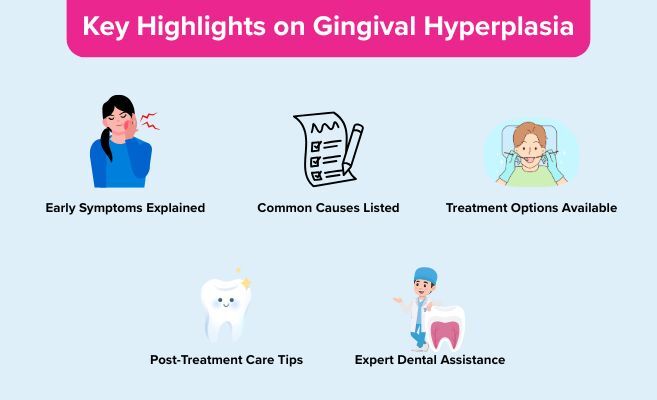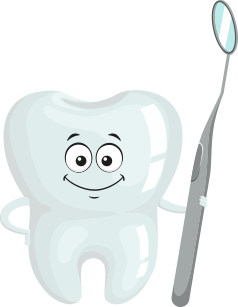Gingival Hyperplasia – Symptoms, Causes, Treatment

If your gums look swollen or seem to be growing over your teeth it might be more than just mild irritation. This could be a condition called Gingival Hyperplasia where the gum tissue grows excessively around the teeth. It can make brushing or eating uncomfortable and even change how your smile looks.
Gingival Hyperplasia means abnormal gum growth. This condition can make gums thicker, puffier or uneven. Over time, the gum tissue may start to cover parts of your teeth. It not only affects appearance but also makes it harder to maintain good oral hygiene.
Healthy gums fit closely around each tooth. But when Gingival Hyperplasia develops, you may notice:
- Difficulty brushing or flossing properly
- Food getting stuck near the gums
- An uneven or bulky gum line
By understanding the symptoms, causes and treatment of Gingival Hyperplasia you can spot the problem early and maintain your oral hygiene. After a few professional sessions at Radiant Dental Care you will be able to bring back your gum health and continue with your smile that looks effortless and makes you feel good.
Recognizing Gingival Hyperplasia Symptoms
Spotting the signs early makes treatment easier and more effective. Here are some common symptoms to look out for:
- Gums look swollen or thicker than usual
- Bleeding when brushing or flossing
- Tenderness or discomfort in the gums
- Color changes from pink to red or purple
- Gums covering part of your teeth
- Difficulty keeping teeth clean
If you notice one or more of these symptoms it’s best to visit a dentist for a proper checkup and diagnosis.
Major Gingival Hyperplasia Causes
There are several reasons why gum tissue starts to overgrow. Understanding what’s causing it helps your dentist plan the right treatment.
1. Medication-related causes
Some medicines can make gums grow more than normal. These include:
- Anticonvulsants used for epilepsy such as phenytoin
- Calcium channel blockers for heart problems such as nifedipine or amlodipine
- Immunosuppressants like cyclosporine used after organ transplants
The extent of gum growth depends on the dosage of oral hygiene and how long the medication has been taken.
2. Poor oral hygiene
Without proper brushing and flossing plaque will slowly but surely attach itself to the place where the gums meet the teeth. This makes the gums not only inflamed but also may result in an increase of gum tissue. If the situation is left untreated it may lead to the development of advanced gum disease.
3. Hormonal changes
Hormonal changes during pregnancy puberty or menstruation can result in the gums becoming more sensitive and therefore swelling more frequently. These situations usually resolve themselves, however, it is still important to have a dentist monitor them.
4. Genetic factors
Overgrown gums can be passed down in a family. This condition is called Hereditary Gingival Fibromatosis and is characterized by slow development over time.
5. Health conditions
It is possible that gum size increase may be a result of some health issues such as leukemia or hormonal disorders. Such instances, along with management, require both dental and medical intervention.

Types of Gingival Hyperplasia
Understanding the type helps in deciding the right treatment method. The condition is usually classified as:
- Inflammatory Gingival Hyperplasia: Caused by poor oral hygiene and plaque buildup
- Drug-Induced Gingival Hyperplasia: Triggered by certain medications
- Hereditary Gingival Hyperplasia: Passed down genetically in families
- Systemic Disease-Related Hyperplasia: Linked with underlying medical conditions
Each type can cause discomfort or affect appearance if not treated on time.
Complications if Left Untreated
Ignoring Gingival Hyperplasia can lead to more than cosmetic issues. Possible problems include:
- Gum infection or periodontal disease
- Tooth decay due to trapped food
- Bad breath caused by bacteria buildup
- Discomfort while chewing or speaking
- Bone loss around the teeth in severe cases
Gingival Hyperplasia Treatment Options
Treatment depends on the cause and severity of the condition. Your dentist may suggest one or more of the following:
1. Professional Dental Cleaning
It works to remove plaque and tartar that are the main contributors to gum inflammation. Usually, it’s the very first step in the treatment plan.
2. Medication Adjustment
If a medicine is identified as the cause of the problem then the dentist might talk with your doctor about changing or adjusting the dosage. Do not stop or change your medicines without getting a medical advice.
3. Improved Oral Hygiene
Proper care every day can lead to the reduction of gum swelling and it will keep the condition from coming back.
- You should brush twice a day using a soft toothbrush.
- Floss at least once a day to get rid of the debris.
- Apply a mouthwash that is recommended by a dentist.
4. Operative Treatment
In case the gums are excessively overgrown the removal of the tissue might be required.
- Gingivectomy: Helps to get rid of the extra gum tissue and reshape the gum line.
- Laser gum surgery: A less painful method that is associated with quicker recovery and accurate results.
A place like Radiant Dental Care which is known as one of the best dental clinics in Chennai offers advanced laser techniques for comfortable and effective results.
5. Treating the Root Causes
If gum excessive growth is your case and it is caused by factors such as hormones or blood disorders, then your dentist and doctor will collaborate to eventually treat the root cause.
Post-Treatment Gum Care
After treatment always follow these tips to maintain healthy gums:
- Brush and floss daily
- Visit your dentist every six months
- Eat foods rich in vitamin C and antioxidants
- Avoid smoking and alcohol
- Inform your dentist about any new medications
These small steps can go a long way in preventing the condition from returning.
Prevention Tips for Gingival Hyperplasia
Prevention is always better than cure. You can lower your risk by:
- Brushing correctly and focusing on the gum line
- Flossing daily
- Visiting your dentist regularly for cleaning
- Staying hydrated
- Informing your dentist about all the medicines you take
Good oral habits help maintain both gum and tooth health.
When to See a Dentist
Visit your dentist if you notice:
- Persistent gum swelling
- Bleeding that doesn’t stop easily
- Gums covering part of your teeth
- Difficulty cleaning your teeth
Early treatment can stop the condition from getting worse and keep your gums healthy.
Why Professional Help Matters
Home remedies can reduce discomfort for a while but won’t treat Gingival Hyperplasia completely. Dental professionals can:
- Identify the exact cause
- Plan personalized treatment
- Use safe techniques to reshape gums
At Radiant Dental Care which is one of the best dental hospitals in Chennai patients receive advanced care with modern tools and expert hands to ensure long-lasting results.
Restore Your Gum Health with Expert Dental Care!
Gingival Hyperplasia can be a tiny gum issue that hides very thoroughly under the surface of the gums and is very often just a symptom of the deeper pump. So, recognizing the signs early, knowing the reasons, and obtaining the right treatment are definitely the ways of keeping your oral hygiene safe.
In case you are having any symptoms of gingival overgrowth, do not hesitate to go for a check-up at Radiant Dental Care, a premium dental clinic in Chennai. A professional diagnosis and personalized treatment are what you will get there. Their competent staff will support you in getting back the normal, healthy gums and turning your smile into a shining one again.
Frequently Asked Questions:
1. What is Gingival Hyperplasia?
Ans. Gingival Hyperplasia is when the gum tissue grows excessively around the teeth. The gums may be of the reddish and swollen appearance or even look like a thick puffy mass and at times these might be the areas of the teeth that are partially covered. If a person is unable to treat the disease in time, then brushing of the teeth and the eating process can become uncomfortable.
- What causes Gingival Hyperplasia?
Ans. This phenomenon can result from improper hygiene of the oral cavity, a fixed disease contour medication, change in hormones, or mixture of age and hereditary factors. Apart from these, cancer in the blood cells is among the diseases that cause enlargement of gums.
- Can Gingival Hyperplasia go away on its own?
Ans. If the cases are very mild, then those who keep their mouths clean are likely to have professional cleansings done. But if the sources of medicine, hormones, and other health problems are the reasons for it, a dentist’s help is necessary for proper treatment.
- Is Gingival Hyperplasia painful?
Ans. Normally the condition is not painful, however, it may cause soreness and bleeding or even tenderness in the areas that are brushed. If the growth of the gums is extremely large then the process of eating and talking can also be made uncomfortable.
- How is Gingival Hyperplasia treated?
Ans. The treatment of gum overgrowth depends on the factors that lead to its growth. Your dentist can do gum cleaning, if necessary, change your medicines or recommend the removal of excess gum tissue by either laser or surgery. On the one hand, the treatment performed at Dental clinics like Radiant Dental Care is very advanced and gentle in nature and thus it is easy for patients to get back their healthy gums and a pleasant smile once again.

 +91 9513446186
+91 9513446186
